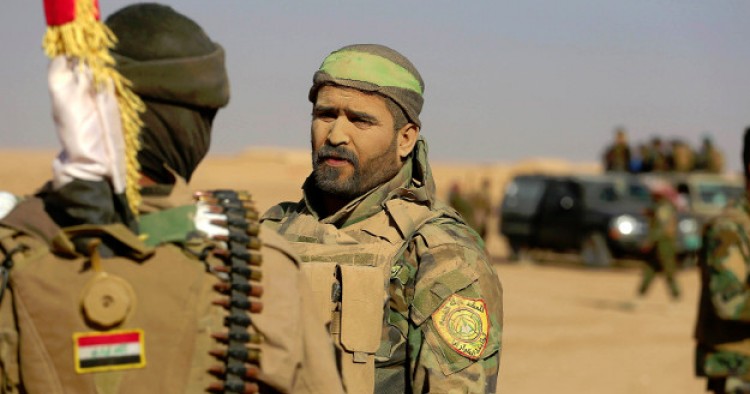Iraq’s Hashd al-Shaabi – the Popular Mobilization Force (PMF) – has announced that its forces are ready to “liberate” western Mosul. On January 31, Ahmed al-Asadi, the PMF’s spokesperson, explained that the PMF’s “sixth phase of operations in the west of Nineveh Province will cover areas from western Mosul to Tal Afar” and will extend to the border of Sinjar. He emphasized that PMF’s participation in western Mosul operations was essential.
The announcement comes just days after Iraqi National Security Advisor Falih al-Fayyad confirmed that “The Popular Mobilization Forces in Nineveh Province will participate in the liberation operation of Tal Afar.” In an interview with Iranian state-run Al-Alam News Network, Fayyad, who is also PMF’s chairman, added: “Hashd al-Shaabi forces have liberated more than 150 villages and also the airbase of Tal Afar. They have now brought the city of Tal Afar under a siege.”
The PMF’s increasing role in western Mosul, particularly in Tal Afar, a city about 40 miles west of Mosul, has been a matter of grave concern for Iraqi Sunnis and regional Sunni leaders, who have repeatedly expressed the worry that Iran-backed sectarian groups within the PMF may engage in revenge killings against Tal Afar’s Sunni inhabitants once the Islamic State is ousted. Turkey, in particular, has warned that it would not remain silent to the PMF’s advances into Tal Afar.
The PMF consists of militia forces largely from Shiite but also other Iraqi ethnic and religious groups. While some PMF units are Iraqi nationalists and follow Iraq’s top cleric Grand Ayatollah Ali Sistani, many prominent groups within PMF have close ties with Qassem Suleimani, the head of the IRGC’s elite Quds Force. What makes Sunnis particularly worried is that, despite PMF’s diversity, it is the Iran-backed militia units within the PMF that are playing the most prominent role in western Mosul. Last month, Jawad al-Talibawi, a spokesman for the armed wing of Asaib Ahl al-Haq, said forces from Kata'ib Hezbollah, Asaib Ahl al-Haq, the Badr Organization, and Kata'ib Sayyid al-Shuhada were tasked to lead the military operations to “liberate” Tal Afar. All these groups are closely linked with Iran’s Quds Force.
Last November, Iraq’s parliament approved a law legalizing the PMF as separate military corps – a decision some Sunni Iraqi politicians and lawmakers derided as a Shiite “dictatorship.” And although the PMF is now an integral part of the Iraqi armed forces, some PMF units continue to commit human rights abuses. Earlier this month, Amnesty International accused some Shiite Iraq militia groups of committing war crimes – including abductions, extrajudicial killings, torture and property destruction – using weapons provided to the Iraq military by at least 16 countries, including the United States.
The Middle East Institute (MEI) is an independent, non-partisan, non-for-profit, educational organization. It does not engage in advocacy and its scholars’ opinions are their own. MEI welcomes financial donations, but retains sole editorial control over its work and its publications reflect only the authors’ views. For a listing of MEI donors, please click here.












